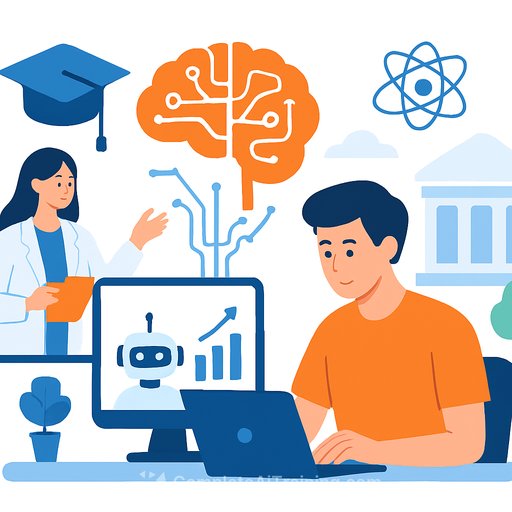WKU Launches AI and Education Graduate Certificate to Meet Soaring Skills Demand
Bowling Green, KY - Western Kentucky University (WKU) has introduced a fully online Graduate Certificate in Artificial Intelligence and Educational Technology Leader, with enrollment starting Fall 2025. The goal is simple: help educators and learning leaders build practical AI fluency, apply it ethically, and improve outcomes across classrooms, programs, and organizations.
What the certificate includes
- Format: 100% online, 15 credit hours, finish in a year or less, rolling admissions.
- Who it serves: K-12 educators, higher ed faculty and staff, EdTech professionals, and corporate L&D teams.
- Core focus: ethical AI use, educational technology, best practices in online learning, and cybersecurity in learning environments.
- Stackability: credits can be applied to other WKU graduate programs to extend your pathway.
What graduates will be ready to do
- Use AI tools to boost engagement and feedback without sacrificing academic integrity.
- Apply advanced online and blended models that improve access and retention.
- Evaluate new AI products, integrate what works, and sunset what doesn't.
- Plan for cybersecurity risks and strengthen institutional defenses.
- Update curriculum with AI-informed activities and assessments for more personalized learning.
WKU faculty across departments are already using AI for real-time feedback, data analysis, and content creation. The certificate formalizes those skills so educators can lead, not follow.
Why this matters for educators
AI literacy is now a baseline expectation, not a niche skill. Schools that upskill staff will improve instruction, save time on administrative load, and set clear guardrails for responsible use.
Expect more universities to develop similar programs, while policymakers work on data privacy, bias, and access standards. For context on global guidance, see UNESCO's AI in Education resources: UNESCO AI & Education.
Market shifts to watch (context for institutions and vendors)
As AI becomes standard in learning, demand will rise for platforms, infrastructure, and security.
- Infrastructure: Microsoft (NASDAQ: MSFT) and Google (NASDAQ: GOOGL) benefit as institutions adopt Azure AI and Google AI services.
- Content and upskilling: Chegg (NYSE: CHGG), Coursera (NYSE: COUR), and Udemy (NASDAQ: UDMY) may see higher enrollments for AI-related learning.
- Security: Palo Alto Networks (NASDAQ: PANW) and CrowdStrike (NASDAQ: CRWD) stand to gain as schools harden defenses.
- Pressure points: traditional publishers slow to add AI features risk share loss; smaller EdTech firms without AI R&D may struggle to keep pace.
This section is informational and not financial advice.
Practical next steps for schools and districts
- Run a capability audit: where can AI improve instruction, feedback, student support, and operations today?
- Draft an AI use policy covering data privacy, academic integrity, transparency, and model selection.
- Start small pilots in teaching, tutoring, or advising; collect evidence, then scale.
- Tighten data and security practices (MFA, access controls, vendor risk reviews, and incident response). Reference: NIST AI Risk Management Framework.
- Upskill faculty with focused PD on prompts, evaluation rubrics, and course redesign.
- Update assessments to value process, iteration, and authentic outputs over recall-only tasks.
Where to build skills fast
WKU's certificate provides a clear path for educators who want formal training that translates to practice. If you need flexible options while teams ramp up, explore role-based AI learning paths here: Complete AI Training - Courses by Job.
What comes next
Expect a wave of micro-credentials, frequent curriculum refreshes, and stronger guidance on privacy and bias. Educators who build AI literacy now will set the standard for effective, equitable learning experiences.
This content is for informational purposes only and is not financial advice.
Your membership also unlocks:






